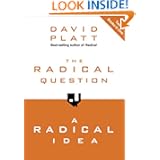 The Radical Question and A Radical Idea by David Platt
The Radical Question and A Radical Idea by David PlattDavid Platt has made a name for himself through his books centering around the idea of being 'Radical' for Christ. What I think this book does well is distill in a small format Platt's teaching from his earlier book entitled Radical Together. The first part of the book devotes considerable space to bringing forth a new vision of how Christians should live in God's world. Settling in to the material driven society we live is not good enough for those who name the name of Christ. To see what Platt is describing, he writes, "A movement of Christians who are forsaking the priorities and pursuits of this world for the spread of the gospel and the glory of Christ. A movement of Christians who have decided that settling for casual, comfortable, business-as-usual Christianity is not longer an option" (35). Looking outside the bounds of your own city to the needs of others, even the basic needs of those in poorer countries is part of Platt's vision for Christians to flourish. In tandem with this vision, Platt once again focuses in on the question of 'Is Jesus worthy of more than a Christian spin on the American dream?" (24). The question is good in that it draws a contrast with what many think the American Dream consists of and what Jesus considers to be of ultimate value, which turns out that they are often in opposition. In the first part of the book Platt does a good job at bearing witness to those in his community that are living for more than a long retirement playing golf each day.
The second half of the book takes quotes from Platt's earlier book entitled Radical Together and seeks to draw people into the vision he casts. This section is radical in that it unmasks some of the practices of American church culture that are undeniably idolatrous. Platt draws the reader in by asking this specific question, "What if the church itself is intended to be the attraction, regardless of who is teaching or singing that day?" (75). We have made it a priority in our preaching schedule to not let the congregation know who is preaching next for this very reason that Platt brings up. Too often we get enamored with a personality and not the changing and forgiving grace of God. Often, this cult personality leads people away from the truth and gospel living for a few pet peeve ideas, with the intent of bringing them under their control. As Platt mentions later, even a building campaign can lead people away from being faithful to their calling if we focus too much on the building side of things and not the people in ministry.
The only two criticisms I have are regard to Platt's vision and his application of that vision. One, although we want to forsake the glory of this world's materialistic enticements, God has made the world in such a way that we are to minister in whatever capacity God calls us to. Christians are not anti-world but are concerned with the drag towards sin that the world's temptations offer. Secondly, I think more could be said about how Christians can minister in the very place they live without feeling guilty about not doing a ton for the ministry overseas. God has given us many relationships around us that need to be cultivated for the gospel. Just because people are going and doing overseas missions doesn't mean they are more spiritual, but rather they are called to a specific kind of ministry.
Much thanks to Waterbrook/Multnomah Press for the review copy of this book.
Comments
Post a Comment